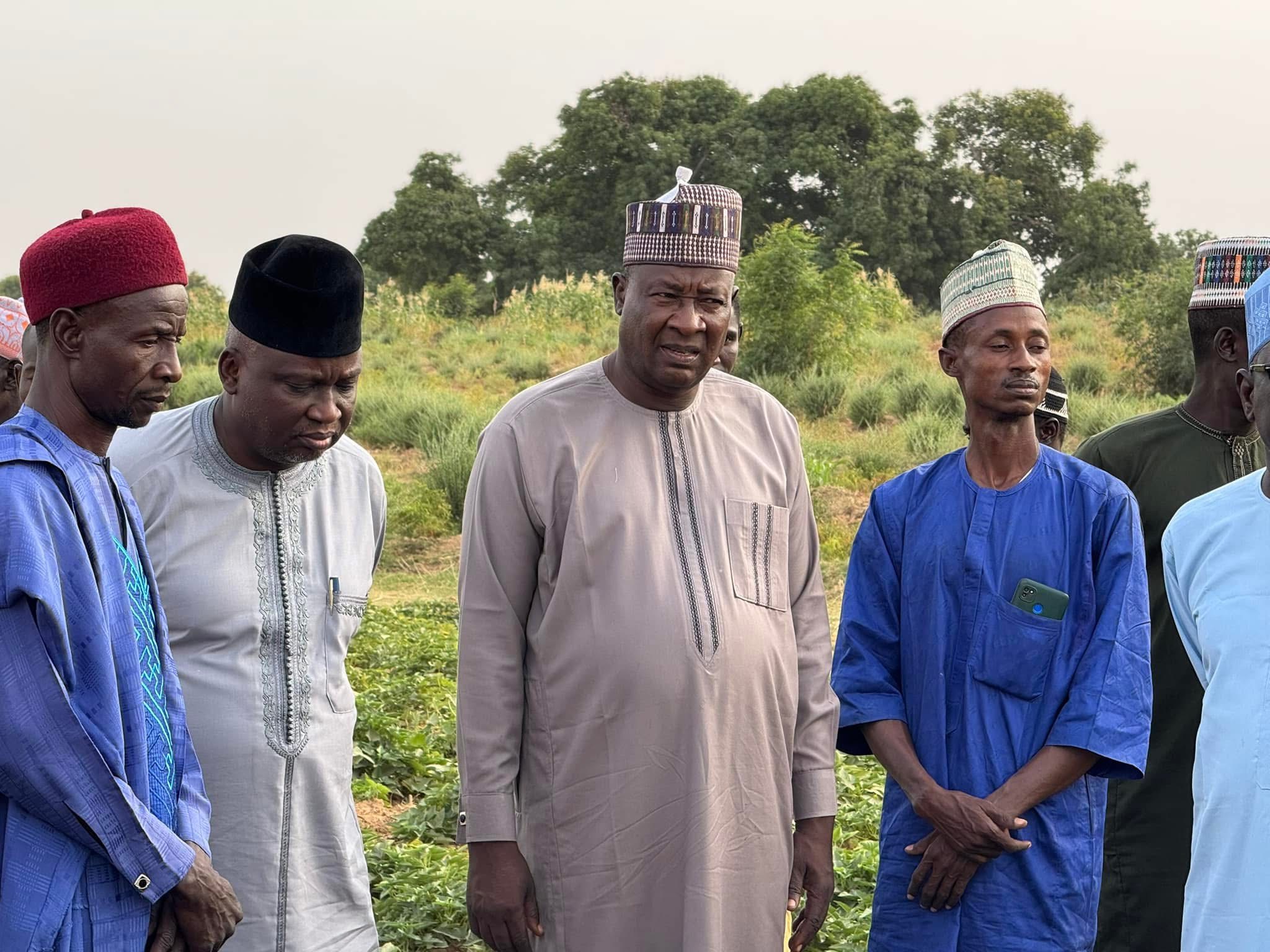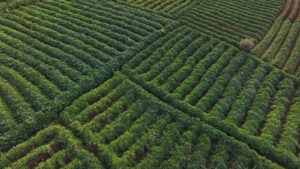Sowing Hope: How C’ River youths are farming their way to employment
By Christian Njoku, News Agency of Nigeria (NAN)
Every morning, as the sun rises, Mary Okon, a young lady in Ikot Nakanda, Akpabuyo Local Government Area, rolls up her sleeves and goes about her job of feeding the fishes in her fish farm, looking out for anything unusual.
Dressed in jeans and rain boots, Okon exchanges pleasantries with neighbours who now see her as a symbol of entrepreneurial dedication and achievement.
However, a few years ago, this was not the case. She had lost her parents, couldn’t secure a job, and had almost given up.

Mary Okon displaying one of her produces, a table size catfish
“Before now, life was very tough for me. I searched for jobs that were hardly available, and the few available ones came with so much pressure.
“People wanted to take advantage of your joblessness before offering you anything,” she recalled.
In 2023, Okon applied for and was selected by the International Fund for Agricultural Development’s Livelihood Improvement Family Enterprises in the Niger Delta (IFAD LIFE-ND) project and was trained in fish farming.
With support from the project, including fingerlings provided to her, she was able to start her own fish farm, which now serves as an incubation point for other trainees.
“This is not just a job for me; it is life. I breed my fishes to table size and sell them in six months. Annually, I make over N1 million, which is more than what many white-collar jobs offer.
“I’m also impacting society by training others. The water from the farm is used in our vegetable garden because it is rich in nutrients, so we eat fresh food too,” she said excitedly.
Similarly, in Idoma Community of Biase LGA, another IFAD LIFE-ND beneficiary, Comfort Anthony, a young lady, is producing and processing cassava.
Anthony said that before her training in 2022, she cultivated cassava using crude and traditional methods that yielded very little until the project came to her rescue by teaching her more effective methods.

Comfort Anthony in her Cassava farm in Idoma Community in Biase LGA of Cross River
“I process my cassava into garri and annually make up to N1.6 million, not to mention having enough to eat. I’m not interested in white-collar jobs because of what I earn from my cassava farm.
“Youths in Nigeria should leverage agriculture instead of job hunting and wasting time. You will have enough to eat and money in your pocket because there’s so much fertile land in this state and across Nigeria,” she said.
For Eyong Ikwa, a poultry farmer in Adim, Biase LGA, his life changed for the better in 2022 after he was trained in poultry farming by the IFAD LIFE-ND project. He started with 200 day-old broiler chicks.
“Between 2020 and 2021, life was very difficult. I could hardly feed myself. Although I had been doing small-scale poultry farming, I didn’t believe in its potential until I was introduced to the IFAD LIFE-ND agric project.
“I was selected as an incubatee in the project, and after six months of training, I was given 200 day-old chicks and bags of feed both starter and finisher,” Ikwa narrated.

Iyong Ikwa in his poultry farm in Adim, Biase LGA of Cross River
Today, his farmhouse boost of about 1,500 birds, which have consumed about 250 bags of feed worth approximately N6 million.
He has also completed the construction of a new poultry facility with a 5,000-bird capacity, making him the proud owner of the biggest poultry farm in Adim community.
“In a year, I make nothing less than N15 million. I’ve also employed other young people who work and learn on the farm, instead of roaming the streets or engaging in vices,” he said.
Mr Paul Agbor is another young man who has turned his fortunes around using agriculture as a springboard.
Based in Alangkel community in Ogoja LGA, Agbor cultivates rice in marshy fields and has been able to transform not only his life but also the lives of others.
“I thank God for the IFAD LIFE-ND training and support I received a few years ago. Before that, I had nothing, not even a machete. But today, I have six trainees learning rice cultivation from me. I trained five others in 2024, and they’ve all started their own farms,” he said.
After his training in 2022, Agbor was provided with two bags of rice seedlings, 10 bags of fertilizer, and N600,000 in support. Today, his farm has grown so large that he can no longer manage it alone.
“In 2024, I sold many bags of rice and made good money, as the weather was favourable. You can earn more than N5 million annually,” he revealed.

Paul Agbor in his rice plantation in Alangkel Community in Ogoja LGA
Recent data from the National Bureau of Statistics (NBS) shows that in 2nd quarter of 2024, Nigeria’s youth unemployment rate dropped to 6.5 per cent, down from 8.4 per cent in the 1st quarter.
While this indicates a positive trend, it still translates to around 4.18 million Nigerian youths between the ages of 15 and 34 who are unemployed.
Nigeria has one of the youngest populations in the world, with over 60 per cent under the age of 25.
Agriculture employs over 35 per cent of Nigeria’s workforce and contributes about 25 per cent to the nation’s Gross Domestic Product (GDP) yet, much of it remains at the subsistence level.
Mr Innocent Ogbin, the IFAD LIFE-ND Programme Coordinator in Cross River, said the project, initially planned for six years and scheduled to end in September 2025, has received additional funding to continue for another three years.
He explained that the project was modelled after the master-apprentice structure common in southeastern Nigeria.
“This project, and others like it, became necessary due to the high level of youth unemployment in the nation and the multidimensional poverty in the country’s rural communities.
“So, the goal is to enhance income, food security, and job creation for rural youths and women through agribusiness development initiatives on a sustainable basis.
“That’s why we focused on rice, cassava, poultry, and fish production—areas in which we have a comparative advantage and that can yield quick returns for the youths,” he said.
Ogbin noted that in the past five years, the project, which targeted over 4,000 youths in Cross River, has recorded an output of 14,800 metric tons of commodities which includes: 6,230 metric tons of cassava; 6,578 metric tons of rice; 922.3 metric tons of fish and 598.7 metric tons of poultry.
This, he said, amounted to a gross income of over ₦4 billion within the period.
According to Ogbin, the selection process was community-based, as the team worked with registered cooperatives that reported to the leadership of the benefiting communities and the Agricultural Development Programme (ADP), which already had structures in those communities.
“We attained a certain level of success, but it did not come without its share of challenges. For example, while we were trying to support these budding agri-preneurs, we faced disruptions such as COVID-19 and the Naira redesign. These came as shocks that almost destabilised their businesses.
“There was also the issue of the inability of the former state administration to pay its counterpart funding, and insecurity in some communities, which affected some of our beneficiaries and staff.
“This negatively impacted the market, especially in terms of off-taking because if off-takers cannot access a community due to insecurity, the produce piles up and becomes a problem for the producers.
“I encourage youths to take advantage of initiatives like the IFAD LIFE-ND project, because agriculture is elastic and can accommodate a wide range of interests across its value chains,” he said.
Prof. Chijioke Osuji, an Agro-Industry and Value Chain Expert from the Federal University of Technology, Owerri (FUTO), said agriculture remains one of the easiest ways to gainfully employ Nigerian youths, if the value chain is properly understood.
“Not every youth has to become a farmer but they can participate at various points in the agricultural value chain, from logistics to storage and even graphic design for branding products.
“Instead of promising to develop 10,000 hectares and doing nothing, governors should aim for 500 hectares yearly, and allocate one hectare to each youth for specific crops.
“That way, 500 youths are empowered yearly, and others can go into processing so farmers don’t have to sell their produce cheaply,” he added.
Osuji recommended the creation of agro-processing zones or hubs, offering shared facilities like power and water. These hubs would serve as centres for youth training and support in food processing and agribusiness.(NAN)(www.nannews.ng)
**This story is with support from the Solution Journalism Network (SJN) and the Nigeria Health Watch (NHW).
***If used, credit the writer and the News Agency of Nigeria(NAN).





 During an inspection tour of the affected communities, Alhaji Shehu Ma’azu, Commissioner for Agriculture and Natural Resources in Kebbi, provided insights into the programme’s objectives.
During an inspection tour of the affected communities, Alhaji Shehu Ma’azu, Commissioner for Agriculture and Natural Resources in Kebbi, provided insights into the programme’s objectives.
